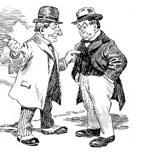
The New-Generation Liberal Catholic: He’ll Switch Rather Than Fight
POST-CONCILIAR CATECHESIS & SELF-DESTRUCTION
When we run across Catholics eager to reform the Church in a “liberal” direction, many of us wonder: “Why do they bother? Why don’t they simply switch to some other church more to their taste?”
If, like the people in the European Middle Ages, we lived in a society in which Catholicism was the only religion, it would be easy to understand their combination of zeal for reform and antipathy to switching. After all, there would be no alternative churches to switch to. Hence it would be a case of either reforming the one and only church or putting up with a status quo they are deeply dissatisfied with.
But we Americans live in a land of phenomenal religious diversity. Not since the early centuries of the Roman empire has the world seen a society with so many religions — hundreds, if not thousands, of distinct religious groups. Most of these are varieties of Protestantism, which has proven itself capable of taking on more forms than Proteus. But one can also find Eastern Orthodoxy, Judaism, Islam, Hinduism, Buddhism, Native American religions, and others, and each of these comes in a number of varieties. Thus, for the dissatisfied Catholic, there is an immense menu of alternative religions to choose from.
This tremendous diversity is due in large measure to our nation’s Protestant heritage. From its beginning, Protestantism was founded on the principle of “private judgment” — the right of the individual to interpret Scripture for himself, or, more generally, the right of the individual to determine the content of his religious belief without depending on the judgment of the pope or any other religious authority.
You May Also Enjoy
Snyder, baptized a Lutheran, entered prison as a nonbeliever but died less than a year later as a Roman Catholic. Was her conversion sincere?
Review of The Catholic Moment by Richard John Neuhaus and The Cost of Discipleship by Dietrich Bonhoeffer
By understanding the true nature of heresies, we can overcome many centuries of Protestant disinformation and misrepresentation.

